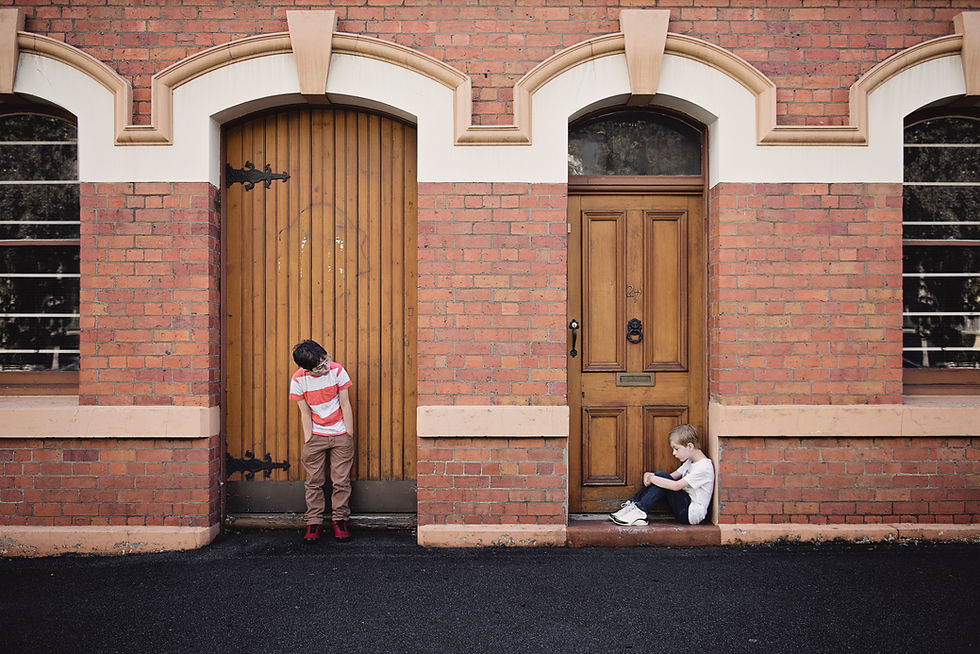Should We Stop Caring So Much About Our Kid's Happiness?
- Emily Dauris

- Nov 19, 2020
- 6 min read
‘All I want is for you to be happy’.
- It’s one of those common parenting sentiments heartfully pressed onto children, like a kiss on the cheek, in a means to assure them that they can be whoever they want to be. There are, of course, many similar versions of this phase - ‘Just do whatever makes you happy’, ‘I don’t mind, as long as it makes you happy,’ and so on.

It’s a concept which crept into the baby boomer generation of parents. Likely in a backlash against roles that might have been forced upon them. Attempts to steer the post-war generation into secure professional careers paths such as a doctor, lawyer or accountancy. Or towards the housewife role for many young girls who were given baby dolls at the age of three to commence the training. For those who became parents in the 80s and 90s, telling their children that the biggest success they can have is happiness, wherever they may find it, seemed an assurance of unconditional love. An important move towards a more accepting and equal world. Which is why many of those children, now parents themselves, are still saying it.
Let me first assure you that I believe this phase I believe is used with the most positive intent, to empower and inspire whoever it is directed towards. I’ve said it and I grew up having it said to me. The sentiment is to let children know that they are free to be who they are and follow the path that seems truest to them, without judgement. Yet, it’s that ‘as long as it makes you happy/all I want is for you to be happy’ part that I’d just like to explore, and here is why.

In the last decade we have become increasingly conscious of mental health and just how many people suffer, have suffered or will suffer from some form of mental illness in their lives. Thankfully, the taboo of depression is fast becoming dismantled. Largely due to the willingness of people in the media to come out to speak about their personal experiences and somewhat normalising it. Encouraging others to ask for help and to talk about their conditions without fear of judgement. Of course, not necessarily being happy at certain points in your life does not always mean you have depression in a medical sense. It is perfectly normal to have bad days or weeks or months even. Whether that is because something has happened in your life or it’s just a touch of unexplainable blues. Happiness is not the natural consistent state of humankind. Contempt, perhaps, with ups and downs thrown in now and then is what most of us generally experience. We’re not living in ‘Brave New World’ just yet. We’re not supposed to be fulfilled all of the time and we need to be able to talk about that. How though, is this possible if you were brought up being told that the only important wish someone had for you was to be happy? How are you supposed to be able to tell them if you’re not? It’s tragic that an expression of unconditional love that was meant to let a child know that they could be anything they wanted to be was ok, could result in them feeling they ever have to pretend to be someone else. Someone happy.
Most parents love their children more than anything else in the world. As a mother myself, I know I question my words and actions multiple times a day. Wondering if I’ve said anything which might be damaging to my child in the long run. It can seem utterly impossible to get right. Which is why I’m hesitant to bring this up. Don’t we put enough pressure on ourselves? Since we’re doing it anyway though, it seems we might as well ask if telling our children that our biggest wish for them is that they’re happy, could be one of those damaging things we’ll torture ourselves over for years to come. So, here we go.
Let’s imagine a young girl who knows she’s loved and fully returns that love to her parents. Everything her family has done for her has been to ensure she feels confident, secure and happy. Yet, for some reason she can’t fathom, she’s started to count calories. Began to hate her body. She suspects she might be developing an eating disorder. Already anxious, confused and wrestling with an inner voice that is telling her she’s not good enough, how can she tell the people who love her most that she is unhappy? Knowing that it will make them feel as if they’ve failed her. In this state, it’s easy for someone to feel less like they are asking for help and more as if they’re spreading the sickness.

Now, let’s consider a 35-year-old man who’s wife has just had a baby. He’s always wanted to be a Graphic Designer, and he’s done it. He is working at a great company earning good money, doing exactly what he’s always wanted to do. In addition, he has found love, had it returned and gotten married. Just recently, his dream of being a father has come true. Everything that he’s ever wanted has happened. The parents, who supported him throughout and made clear that he could grow to be anything he wanted to be as long as he was happy, are beside him and proud. Only, he isn’t happy. He doesn’t know why, but he feels detached. The world has become grey, everything seems trivial. It takes everything he has to get out of bed every morning and face the world he wishes he could shut out. How can he tell anyone this? Least of all the parents who have sacrificed so much to enable the happiness which eludes him? You see, not being happy insidiously becomes the failure. Often even more so than mental illness or job loss or weight gain or losing a sense of direction or whatever it is that has led to the unhappiness. The unhappiness that is merely a symptom becomes the real problem. Because we know we can be anything we want to be, except unhappy. Why are we so afraid of being unhappy? Or of our children ever being unhappy? Not being happy is perfectly natural. Only, we can’t treat it as such because the pursuit of happiness is supposed to be the basis of our lives. If we’re not at least on the path to it, then we must have done something wrong. Or maybe someone else did something wrong. Either way, it needs to be fixed. Preferably before you admit to it.

Naturally, to gain the most from life, we are all on a quest for joy. Which is why we wish happiness for our children. On the surface, this is the loveliest of wishes. Perhaps even the most we can hope for. Yet, if we consider that it is entirely unrealistic to be genuinely happy most of the time, then we are promoting an unachievable goal. We’ve decided by now that fairytale endings don’t exist so why do we still wish happiness for our children as if it’s possible to be everlasting? Maybe it is time to stop making wishes for our children? We are not fairy godmothers after all. It is not our job to wish for their future but to prepare them for it. Perhaps our wishes should be reserved for ourselves. The wish, for instance, that when our children are unhappy they may feel they can drift back to us unashamed. That they may rest their heads on our shoulders and tell us of how they’re struggling, knowing that that’s ok.
To do this though, we don’t just have to stop telling our children we want them to be happy, we need to overcome our fears for them. Predominantly, the fear that arises when we wonder if they’re unhappy. It’s not peculiar that this fear disables us. With so many stories and warnings about teen suicide, eating disorders, self-harm and adolescent depression it’s no wonder we’re afraid that the people we love most in the world might be at risk. And it’s only natural that when something threatens your children you’re going to rush in to protect them. Only, happiness is not the cure. It’s not a vaccine which will protect them against the infection of any of these conditions.
I believe, without being able to do it yet myself, that if we can learn to make peace with unhappiness as opposed to raging war against it, then we can overcome the stigma. If unhappiness is a monster that hides in the dark then we are afraid of something we don’t understand. Maybe it’s time to bring it out into the light, accept it as part of our great range of emotions and walk through life unashamed if it appears, from time-to-time, beside us. If we can master this, then we may raise a generation who still leap up to catch happiness but do not run in fear from sadness. Though they may take a break from the game to sit with it a while, they will sit only with sadness and not with fear or shame.








Comments